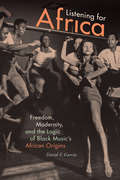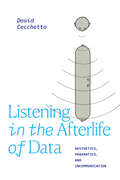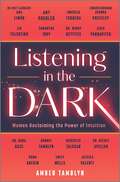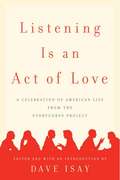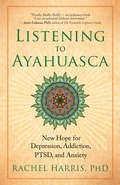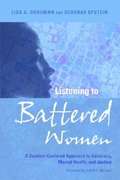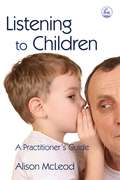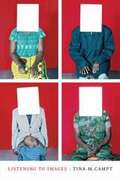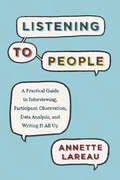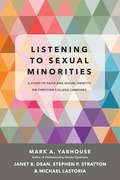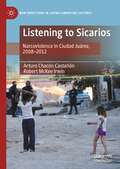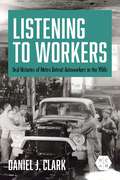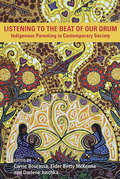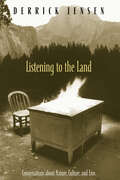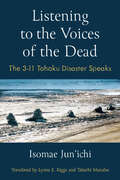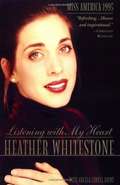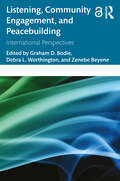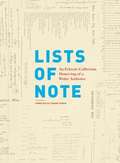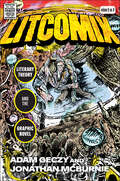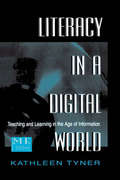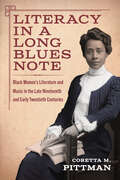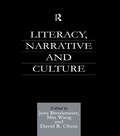- Table View
- List View
Listening for Africa: Freedom, Modernity, and the Logic of Black Music's African Origins
by David F. GarcíaIn Listening for Africa David F. Garcia explores how a diverse group of musicians, dancers, academics, and activists engaged with the idea of black music and dance’s African origins between the 1930s and 1950s. Garcia examines the work of figures ranging from Melville J. Herskovits, Katherine Dunham, and Asadata Dafora to Duke Ellington, Dámaso Pérez Prado, and others who believed that linking black music and dance with Africa and nature would help realize modernity’s promises of freedom in the face of fascism and racism in Europe and the Americas, colonialism in Africa, and the nuclear threat at the start of the Cold War. In analyzing their work, Garcia traces how such attempts to link black music and dance to Africa unintentionally reinforced the binary relationships between the West and Africa, white and black, the modern and the primitive, science and magic, and rural and urban. It was, Garcia demonstrates, modernity’s determinations of unraced, heteronormative, and productive bodies, and of scientific truth that helped defer the realization of individual and political freedom in the world.
Listening in the Afterlife of Data: Aesthetics, Pragmatics, and Incommunication (Thought in the Act)
by David CecchettoIn Listening in the Afterlife of Data, David Cecchetto theorizes sound, communication, and data by analyzing them in the contexts of the practical workings of specific technologies, situations, and artworks. In a time he calls the afterlife of data—the cultural context in which data’s hegemony persists even in the absence of any belief in its validity—Cecchetto shows how data is repositioned as the latest in a long line of concepts that are at once constitutive of communication and suggestive of its limits. Cecchetto points to the failures and excesses of communication by focusing on the power of listening—whether through wearable technology, internet-based artwork, or the ways in which computers process sound—to pragmatically comprehend the representational excesses that data produces. Writing at a cultural moment in which data has never been more ubiquitous or less convincing, Cecchetto elucidates the paradoxes that are constitutive of computation and communication more broadly, demonstrating that data is never quite what it seems.
Listening in the Dark: Women Reclaiming the Power of Intuition
by Amber TamblynAmber Tamblyn, Jessica Valenti, Lidia Yuknavitch, Jia Tolentino, Samantha Irby, Meredith Talusan, Congresswoman Ayanna Pressley, Amy Poehler, America Ferrera, Ada Limón, and Huma Abedin are among the impressive list of authors contributing to this powerful collection of essays that takes a fresh and powerful look at our relationship to intuition and how we can harness it to change our everyday lives and the world. For generations, women have been taught to ignore their intuitive intelligence, whether in their personal lives or professional ones, in favor of making logical, evidence-based decisions. But what if that small voice or deeper knowing was our greatest gift, an untapped power we could use to affect positive change?Edited by award-winning author, activist, and actress Amber Tamblyn, Listening in the Dark is a compilation of some of today&’s most striking women visionaries across industries—in literature, science, art, education, medicine, and politics—who share their experiences engaging with their own inner wisdom in pivotal, crossroad moments.Filled with deeply personal and revelatory essays, Listening in the Dark will empower readers to reconnect with their own unique intuitive process, to see it as the precious resource it is, and to be unafraid to listen to all that it has to say and all that it has to offer.
Listening is an Act of Love: A Celebration of American Lives from the StoryCorps Project
by Dave IsaySelection of excerpts from oral history interviews from the StoryCorps Project which are also broadcast on NPR's "Morning Edition" every Friday.
Listening to Ayahuasca: New Hope for Depression, Addiction, PTSD, and Anxiety
by Rachel Harris, PhDUsed for thousands of years by indigenous tribes of the Amazon rain forest, the mystical brew ayahuasca is now becoming increasingly popular in the West. Psychologist Rachel Harris here shares her own healing experiences and draws on her original research (the largest study of ayahuasca use in North America) into the powerful medicine’s effects on depression, addiction, PTSD, and anxiety. In this wide-ranging and personal exploration, Harris details ayahuasca’s risks and benefits, helping readers clarify their intentions and giving psychotherapists a template for transformative care and healing.
Listening to Battered Women: A Survivor-Centered Approach to Advocacy, Mental Health, and Justice
by Deborah Epstein Lisa A. GoodmanListening to Battered Women: A Survivor-Centered Approach to Advocacy, Mental Health, and Justice presents an in-depth, multidisciplinary look at society's responses to domestic violence. Though substantial reforms have been made in the services available to battered women since the 1970s, the book shows how the public and private systems available to victims of domestic violence are still failing to meet the needs of the women who seek help. Using a feminist perspective, authors Lisa Goodman and Deborah Epstein explore and critique the current available services in three different arenas: the domestic violence advocacy community, the mental health profession, and the justice system. In recent years, the options available to battered women have expanded dramatically. However, these reforms have been made at the expense of the contextualized, women-centered focus that was once at the heart of the anti-domestic violence movement. The authors argue that a renewed focus on the principles of the early feminist movement - for example, listening to individual women's voices, promoting supportive communities, and facilitating economic empowerment, could result in substantial progress in efforts to protect and counsel battered women. A series of concrete recommendations for improvements in the advocacy, mental health, and justice systems are also discussed. Researchers interested in the field of violence, gender studies, psychology of women, mental health trauma, or family law, as well as practitioners working with the victims of intimate partner violence, will find this book to be a valuable resource in their efforts.
Listening to Children: A Practitioner's Guide
by Alison Mcleod'Listening to children' is one of those feel-good phrases that always features in childcare literature as if it were self-evidently a good thing. Often, however, there is a lack of critical attention to what it really means: How does one listen? How can one evidence that listening has taken place? Starting with an introduction to the policy and practice of listening to children and young people, both individually and in groups, this practitioner's guide provides a range of practical techniques for effective listening, encompassing observation and communication, seeing things from the child's point of view, explaining difficult concepts, helping young people to talk about their experiences and express their feelings, promoting participation and eliciting their wishes and views. The book is peppered throughout with good practice checklists, good practice examples, reflective exercises and quotations from children, as well as case studies showing real situations where effective communication has been established with a child. Listening to Children: A Practitioner's Guide is a rich source of insight and guidance for professionals working with children in the fields of social care, health and education, including child welfare protection, pastoral care, educational psychology and counselling, and indeed for anyone working with children.
Listening to Images
by Tina M. CamptIn Listening to Images Tina M. Campt explores a way of listening closely to photography, engaging with lost archives of historically dismissed photographs of black subjects taken throughout the black diaspora. Engaging with photographs through sound, Campt looks beyond what one usually sees and attunes her senses to the other affective frequencies through which these photographs register. She hears in these photos—which range from late nineteenth-century ethnographic photographs of rural African women and photographs taken in an early twentieth-century Cape Town prison to postwar passport photographs in Birmingham, England and 1960s mug shots of the Freedom Riders—a quiet intensity and quotidian practices of refusal. Originally intended to dehumanize, police, and restrict their subjects, these photographs convey the softly buzzing tension of colonialism, the low hum of resistance and subversion, and the anticipation and performance of a future that has yet to happen. Engaging with discourses of fugitivity, black futurity, and black feminist theory, Campt takes these tools of colonialism and repurposes them, hearing and sharing their moments of refusal, rupture, and imagination.
Listening to People: A Practical Guide to Interviewing, Participant Observation, Data Analysis, and Writing It All Up (Chicago Guides to Writing, Editing, and Publishing)
by Annette LareauA down-to-earth, practical guide for interview and participant observation and analysis. In-depth interviews and close observation are essential to the work of social scientists, but inserting one’s researcher-self into the lives of others can be daunting, especially early on. Esteemed sociologist Annette Lareau is here to help. Lareau’s clear, insightful, and personal guide is not your average methods text. It promises to reduce researcher anxiety while illuminating the best methods for first-rate research practice. As the title of this book suggests, Lareau considers listening to be the core element of interviewing and observation. A researcher must listen to people as she collects data, listen to feedback as she describes what she is learning, listen to the findings of others as they delve into the existing literature on topics, and listen to herself in order to sift and prioritize some aspects of the study over others. By listening in these different ways, researchers will discover connections, reconsider assumptions, catch mistakes, develop and assess new ideas, weigh priorities, ponder new directions, and undertake numerous adjustments—all of which will make their contributions clearer and more valuable. Accessibly written and full of practical, easy-to-follow guidance, this book will help both novice and experienced researchers to do their very best work. Qualitative research is an inherently uncertain project, but with Lareau’s help, you can alleviate anxiety and focus on success.
Listening to People: A Practical Guide to Interviewing, Participant Observation, Data Analysis, and Writing It All Up (Chicago Guides to Writing, Editing, and Publishing)
by Annette LareauA down-to-earth, practical guide for interview and participant observation and analysis. In-depth interviews and close observation are essential to the work of social scientists, but inserting one’s researcher-self into the lives of others can be daunting, especially early on. Esteemed sociologist Annette Lareau is here to help. Lareau’s clear, insightful, and personal guide is not your average methods text. It promises to reduce researcher anxiety while illuminating the best methods for first-rate research practice. As the title of this book suggests, Lareau considers listening to be the core element of interviewing and observation. A researcher must listen to people as she collects data, listen to feedback as she describes what she is learning, listen to the findings of others as they delve into the existing literature on topics, and listen to herself in order to sift and prioritize some aspects of the study over others. By listening in these different ways, researchers will discover connections, reconsider assumptions, catch mistakes, develop and assess new ideas, weigh priorities, ponder new directions, and undertake numerous adjustments—all of which will make their contributions clearer and more valuable. Accessibly written and full of practical, easy-to-follow guidance, this book will help both novice and experienced researchers to do their very best work. Qualitative research is an inherently uncertain project, but with Lareau’s help, you can alleviate anxiety and focus on success.
Listening to People: A Practical Guide to Interviewing, Participant Observation, Data Analysis, and Writing It All Up (Chicago Guides to Writing, Editing, and Publishing)
by Annette LareauA down-to-earth, practical guide for interview and participant observation and analysis. In-depth interviews and close observation are essential to the work of social scientists, but inserting one’s researcher-self into the lives of others can be daunting, especially early on. Esteemed sociologist Annette Lareau is here to help. Lareau’s clear, insightful, and personal guide is not your average methods text. It promises to reduce researcher anxiety while illuminating the best methods for first-rate research practice. As the title of this book suggests, Lareau considers listening to be the core element of interviewing and observation. A researcher must listen to people as she collects data, listen to feedback as she describes what she is learning, listen to the findings of others as they delve into the existing literature on topics, and listen to herself in order to sift and prioritize some aspects of the study over others. By listening in these different ways, researchers will discover connections, reconsider assumptions, catch mistakes, develop and assess new ideas, weigh priorities, ponder new directions, and undertake numerous adjustments—all of which will make their contributions clearer and more valuable. Accessibly written and full of practical, easy-to-follow guidance, this book will help both novice and experienced researchers to do their very best work. Qualitative research is an inherently uncertain project, but with Lareau’s help, you can alleviate anxiety and focus on success.
Listening to Sexual Minorities: A Study of Faith and Sexual Identity on Christian College Campuses (Christian Association for Psychological Studies Books)
by Mark A. Yarhouse Janet B. Dean Stephen P. Stratton Michael LastoriaListening to Sexual Minorities
Listening to Sicarios: Narcoviolence in Ciudad Juárez, 2008-2012 (New Directions in Latino American Cultures)
by Robert McKee Irwin Arturo Chacón CastañónListening to Sicarios presents new insights into the lives of paid assassins of Mexico’s drug trafficking syndicates from the perspectives of the assassins themselves. Based on an extraordinary series of ethnographic interviews carried out in the wake of the record levels of narcoviolence experienced in Ciudad Juárez between 2008 and 2012, this study analyzes the ways in which these young men interpret their actions across four key thematic axes: border infrastructures, youth and responsibility, masculinity and sentiment, and ethics: good vs. evil.It argues that sicarios follow a career path within a criminal corporate infrastructure that is especially robust in Mexican border cities. It also explores how sicarios understand youthful innocence in relation to adult accountability in the realm of violence that is frequently meted out by young men on other young men. It then analyzes sicarios’ expressions of feelings of power that may boost their sense of virility, as well as feelings of fear and regret that imply weakness. Finally, it examines how sicarios defend their personal integrity in the face of a public discourse that views their acts as savage.
Listening to Workers: Oral Histories of Metro Detroit Autoworkers in the 1950s (Working Class in American History)
by Daniel J. ClarkHistorians and readers alike often overlook the everyday experiences of workers. Drawing on years of interviews and archival research, Daniel J. Clark presents the rich, interesting, and sometimes confounding lives of men and women who worked in Detroit-area automotive plants in the 1950s. In their own words, the interviewees frankly discuss personal matters like divorce and poverty alongside recollections of childhood and first jobs, marriage and working women, church and hobbies, and support systems and workplace dangers. Their frequent struggles with unstable jobs and economic insecurity upend notions of the 1950s as a golden age of prosperity while stories of domestic violence and infidelity open a door to intimate aspects of their lives. Taken together, the narratives offer seldom-seen accounts of autoworkers as complex and multidimensional human beings. Compelling and surprising, Listening to Workers foregoes the union-focused strain of labor history to provide ground-level snapshots of a blue-collar world.
Listening to the Beat of the Drum: Parenting In Contemporary Society
by Carrie McKenna BourassaListening to the Beat of Our Drum: Indigenous Parenting in a Contemporary Society is a collection of stories, inspired by a wealth of experiences across space and time from a kokum, an auntie, two-spirit parents, a Metis mother, a Tlinglit/Anishnabe Métis mother and an allied feminist mother. This book is born out of the need to share experiences and story. Storytelling is one of the most powerful forms of passing on teachings and values that we have in our Indigenous communities. This book weaves personal stories to explore mothering practices and examines historical contexts and underpinnings that contribute to contemporary parenting practices. We share our stories with the hope that it will resonate with readers whether they are in the classroom or in the community. Like our contributors, we are from all walks of life, sharing diverse perspectives about mothering whether it be as a mother, auntie, kokum or other adopted role.
Listening to the Land: Conversations about Nature, Culture and Eros
by Derrick JensenIn this far-ranging and heartening collection, Derrick Jensen gathers conversations with environmentalists, theologians, Native Americans, psychologists, and feminists, engaging some of our best minds in an exploration of more peaceful ways to live on Earth. Included here is Dave Foreman on biodiversity, Matthew Fox on Christianity and nature, Jerry Mander on technology, and Terry Tempest Williams on an erotic connection to the land. With intelligence and compassion, Listening to the Land moves from a look at the condition of the environment and the health of our spirit to a beautiful evocation of eros and a life based on love.
Listening to the Voices of the Dead: The 3-11 Tohoku Disaster Speaks (Michigan Monograph Series in Japanese Studies #103)
by Jun'ichi IsomaeListening to the Voices of the Dead is an account of the author’s search for the disquieted voices of the dead in the wake of the March 11, 2011, Tōhoku Disaster and his attempt to translate those voices for the living. Isomae Jun’ichi considers the disaster a challenge for outside observers to overcome, especially for practitioners of religion and religious studies. He chronicles the care and devotion for the dead shown by ordinary people, people displaced from their homes and loved ones. Drawing upon religious studies, Japanese history, postcolonial studies, and his own experiences during the disaster, Isomae uncovers historical symptoms brought to the surface by the traumas of disaster. Only by listening to the disquieted voices of the dead, translating them, and responding to them can we regain our true selves as well as offer peace to the spirits of the victims. While Listening to the Voices of the Dead focuses on a specific event in Japanese history and memory, it captures a broadening critique at the heart of many movements responding to how increasing globalization impacts our sense of place and community.
Listening with My Heart
by Angela Elwell Hunt Heather Whitestone<P>Heather Whitestone. Her name has become synonymous with incredible determination and unprecedented achievement. In Listening with My Heart, Heather tells her own story and the stories of others who have inspired her, proving that with hard work, perseverance, and faith, each of us can move mountains. <P>Profoundly deaf since she was eighteen months old, Heather strove to live a normal life, and refused to listen to the voices of discouragement that many of us so often hear, no matter what problems confront us. She wouldn't listen to the doctor who said she wouldn't develop beyond third-grade abilities, or to those who said she would never dance ballet, or even speak. She did, however, hear the encouraging spirit of her family and followed the guidance of her own heart's dreams. <P>Struggling through her difficulties, she was sustained by every success--no matter how small--and ultimately became Miss America 1995. Though she is disabled, her incredible gifts have inspired many throughout the world, and in Listening with My Heart she at last shares her life-changing wisdom.
Listening, Community Engagement, and Peacebuilding: International Perspectives
by Debra L. Worthington Graham D. Bodie Zenebe BeyeneThis book explores the role of listening in community engagement and peacebuilding efforts, bridging academic research in communication and practical applications for individual and social change. For all their differences, community engagement and peacebuilding efforts share much in common: the need to establish and agree on achievable and measurable goals, the importance of trust, and the need for conflict management, to name but a few. This book presents listening – considered as a multi-disciplinary concept related to but distinct from civility, civic participation, and other social processes – as a primary mechanism for accomplishing these tasks. Individual chapters explore these themes in an array of international contexts, examining topics such as conflict resolution, restorative justice, environmental justice, migrants and refugees, and trauma-informed peacebuilding. The book includes contemporary literature reviews and theoretical insights covering the role of listening as related to individual, social, and governmental efforts to better engage communities and build, maintain, or establish peace in an increasingly divided world. This collection provides invaluable insight to researchers, students, educators, and practitioners in intercultural and international communication, conflict management, peacebuilding, community engagement, and international studies.
Listening, Community Engagement, and Peacebuilding: International Perspectives
by Debra L. Worthington Zenebe BeyeneThis book explores the role of listening in community engagement and peacebuilding efforts, bridging academic research in communication and practical applications for individual and social change.For all their differences, community engagement and peacebuilding efforts share much in common: the need to establish and agree on achievable and measurable goals, the importance of trust, and the need for conflict management, to name but a few. This book presents listening – considered as a multi-disciplinary concept related to but distinct from civility, civic participation, and other social processes – as a primary mechanism for accomplishing these tasks. Individual chapters explore these themes in an array of international contexts, examining topics such as conflict resolution, restorative justice, environmental justice, migrants and refugees, and trauma-informed peacebuilding. The book includes contemporary literature reviews and theoretical insights covering the role of listening as related to individual, social, and governmental efforts to better engage communities and build, maintain, or establish peace in an increasingly divided world.This collection provides invaluable insight to researchers, students, educators, and practitioners in intercultural and international communication, conflict management, peacebuilding, community engagement, and international studies.Chapter 10 of this book is freely available as a downloadable Open Access PDF at http://www.taylorfrancis.com under a Creative Commons Attribution-Non Commercial-No Derivatives (CC-BY-ND) 4.0 license.
Lists of Note
by Shaun UsherLists of Note curates 125 unputdownable entries from a list of names that are as eclectic and intriguing as its contents, which include myriad reasons given by ancient Egyptians for missing work, Albert Einstein's demands of his estranged wife, F. Scott Fitzgerald's extensive conjugation of "to cocktail," and many more. Rarely intended for the public eye, these lists reveal hopes, priorities, and musings in a most engaging and entertaining way. Each transcript is accompanied by an artwork, most a captivating facsimile of the list itself. Richly visual and irresistibly readable, Lists of Note is a testament to the human urge to bring order to, poke fun at, and find meaning in the world around us--and is a gift of endless enjoyment and lasting value.
Litcomix: Literary Theory and the Graphic Novel
by Adam Geczy Jonathan McBurnieCritical studies of the graphic novel have often employed methodologies taken from film theory and art criticism. Yet, as graphic novels from Maus to Watchmen have entered the literary canon, perhaps the time has come to develop theories for interpreting and evaluating graphic novels that are drawn from classic models of literary theory and criticism. Using the methodology of Georg Lukács and his detailed defense of literary realism as a socially embedded practice, Litcomix tackles difficult questions about reading graphic novels as literature. What critical standards should we use to measure the quality of a graphic novel? How does the genre contribute to our understanding of ourselves and the world? What qualities distinguish it from other forms of literature? LitComix hones its theoretical approach through case studies taken from across the diverse world of comics, from Yoshihiro Tatsumi’s groundbreaking manga to the Hernandez Brothers’ influential alt-comix. Whether looking at graphic novel adaptations of Proust or considering how Jack Kirby’s use of intertextuality makes him the Balzac of comics, this study offers fresh perspectives on how we might appreciate graphic novels as literature.
Literacy in a Digital World: Teaching and Learning in the Age of Information (Routledge Communication Series)
by Kathleen TynerIn this book, Kathleen Tyner examines the tenets of literacy through a historical lens to demonstrate how new communication technologies are resisted and accepted over time. New uses of information for teaching and learning create a "disconnect" in the complex relationship between literacy and schooling, and raise questions about the purposes of literacy in a global, networked, educational environment. The way that new communication technologies change the nature of literacy in contemporary society is discussed as a rationale for corresponding changes in schooling. Digital technologies push beyond alphabetic literacy to explore the way that sound, image, and text can be incorporated into education. Attempts to redefine literacy terms--computer, information, technology, visual, and media literacies--proliferate and reflect the need to rethink entrenched assumptions about literacy. These multiple literacies are advanced to help users make sense of the information glut by fostering the ability to access, analyze, and produce communication in a variety of forms. Tyner explores the juncture between two broad movements that hope to improve education: educational technology and media education. A comparative analysis of these two movements develops a vision of teaching and learning that is critical, hands on, inquiry-based, and suitable for life in a mobile, global, participatory democracy.
Literacy in a Long Blues Note: Black Women’s Literature and Music in the Late Nineteenth and Early Twentieth Centuries (Margaret Walker Alexander Series in African American Studies)
by Coretta M. PittmanLiteracy in a Long Blues Note: Black Women’s Literature and Music in the Late Nineteenth and Early Twentieth Centuries traces the evolution of Black women’s literacy practices from 1892 to 1934. A dynamic chronological study, the book explores how Black women public intellectuals, creative writers, and classic blues singers sometimes utilize singular but other times overlapping forms of literacies to engage in debates on race. The book begins with Anna J. Cooper’s philosophy on race literature as one method for social advancement. From there, author Coretta M. Pittman discusses women from the Woman’s and New Negro Eras, including but not limited to Angelina Weld Grimké, Gertrude “Ma” Rainey, and Zora Neale Hurston. The volume closes with an exploration of Victoria Spivey’s blues philosophy. The women examined in this book employ forms of transformational, transactional, or specular literacy to challenge systems of racial oppression. However, Literacy in a Long Blues Note argues against prevalent myths that a singular vision for racial uplift dominated the public sphere in the latter decade of the nineteenth century and the early decades of the twentieth century. Instead, by including Black women from various social classes and ideological positions, Pittman reveals alternative visions. Contrary to more moderate predecessors of the Woman’s Era and contemporaries in the New Negro Era, classic blues singers like Mamie Smith advanced new solutions against racism. Early twentieth-century writer Angelina Weld Grimké criticized traditional methods for racial advancement as Jim Crow laws tightened restrictions against Black progress. Ultimately, the volume details the agency and literacy practices of these influential women.
Literacy, Narrative and Culture
by Min Wang David R. Olson Jens BrockmeierAn important contribution to the multi-disciplinary study of literacy, narrative and culture, this work argues that literacy is perhaps best described as an ensemble of socially and historically embedded activities of cultural practices. It suggests viewing written language, producing and distributing, deciphering and interpreting signs, are closely related to other cultural practices such as narrative and painting. The papers of the first and second parts illustrate this view in contexts that range from the pre-historical beginnings of tracking signs' in hunter-gatherer cultures, and the emergence of modern literate traditions in Europe in the 17th to 19th century, to the future of electronically mediated writing in times of the post-Gutenberg galaxy. The chapters of the third present results of recent research in developmental and educational psychology. Contributions by leading experts in the field make the point that there is no theory and history of writing that does not presuppose a theory of culture and social development. At the same time, it demonstrates that every theory and history of culture must unavoidably entail a theory and history of writing and written culture. This book brings together perspectives on literacy from psychology, linguistics, history and sociology of literature, philosophy, anthropology, and history of art. It addresses these issues in plain language – not coded in specialized jargon – and addresses a multi-disciplinary forum of scholars and students of literacy, narrative and culture.
